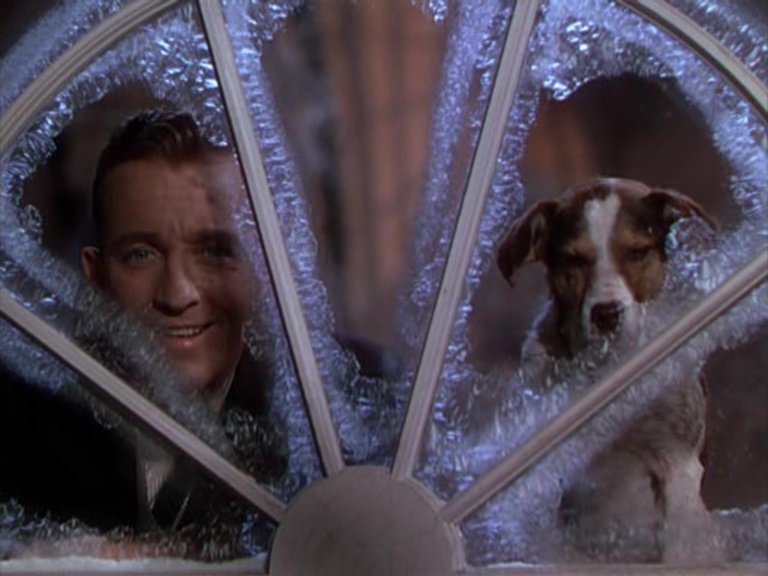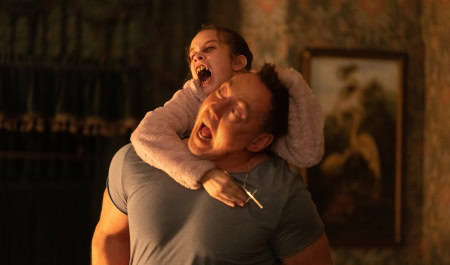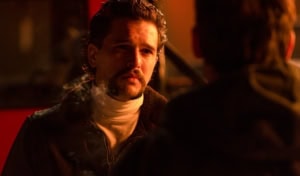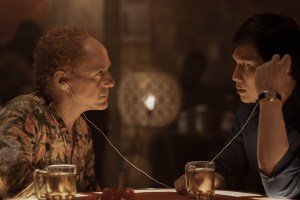With his recent Best Picture and Best Director win for The Lost Weekend, famed auteur Billy Wilder could have made any number of moves with his Hollywood clout. In a career filled with offbeat choices and left turns, one of the most curious entries in his filmography is the 1948 romantic musical The Emperor Waltz. While not something that would be out of place in cinemas of the time, musicals were not the first (or even third) genre you would associate with the director. The endeavor was his attempt to comment upon some of the lingering effects of World War II without delving into specific issues that would place a heavy emotional weight upon him. The resulting film was one where the combination of acclaimed director and A-list talent in front of the camera should have been a massive creative and financial success, but the reality proved to be more middle-of-the-road in both respects. Despite this, any film from Wilder is deserving of due consideration and we are happy to be able to add another puzzle piece to his amazing career.
While Wilder was riding high off recent successes, no one involved in this production was at the height of their powers in the way that Bing Crosby (White Christmas) was in the late 1940s. Crosby plays Virgil Smith, a man first framed in quite a menacing manner before Wilder indulges in his signature flashback to see how we got to a confrontation at a lavish ball. Smith is actually an amiable American traveling salesman on a journey to Vienna, Austria in hopes of getting an endorsement from Emperor Franz Joseph (Richard Haydn). His curious little product is a “orchestra in a box” (aka gramophone) that has the potential to really change the world with a bit of support. The “uncouth” and “brash” American sticks out like a sore thumb among the haughty types who find themselves in the Emperor’s court. He finds himself especially at odds with Countess Johanna Augusta Franziska von Stoltzenberg-Stolzenberg (a mouthful of a name played up by Joan Fontaine, Rebecca) and her father, Baron Holenia (Roland Colver). The Countess has a black poodle named Scheherezade who has been chosen to mate with the emperor’s poodle, but Smith’s dog Buttons throws a wrench into the works.
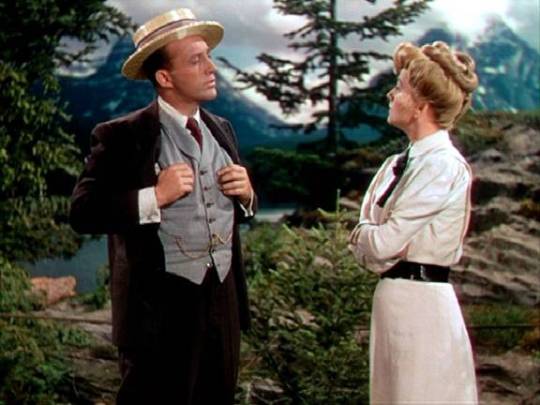
As you can probably guess by this simple distillation, the initial hostility between Johanna and Virgil is not permanent thanks to subsequent encounters. The question is what the journey is like between the initial disdain and the heartwarming romance. Crosby is in prime form when it comes to the musical portions of this film, as standout tunes like “Friendly Mountains” come alive quite beautifully as he saunters through the Alps. This is aided by a chorus line of impeccably structured singers and dancers that add a bit of majesty to the proceedings. It is only when Crosby has to tackle the more straightforward comedy and drama that his style does not always work. For it to feel like a genuine Wilder film, there needs to be more nuance to the character, whereas Crosby goes big almost all the time. Fontaine meanwhile feels wasted in this role that rarely gives her the opportunity to show off her finely honed dramatic skills or break more into a comedic role. The spark just never fully resonates between these two.
The ensemble cast fares a little better in this respect, as Colver makes a meal out of his doddering older man routine that relies on bootlicking and large movement. Haydn likewise gives a distinct personality to the Emperor who could have been a simple caricature and been just as effective. You can see some of what appealed to Wilder with this story, as the commentary on class distinctions and bloodlines were a rich well to draw from even if most audiences would probably not think much about it. They would most likely pay attention to the romance and the music, the latter of which the movie does well. There are not as many numbers as Crosby fans might desire, but those that are included stand out as something special from the singer. The movie looks immaculate from the Technicolor film used to capture the picture to the lush production design that provides a feast for the eyes that partially makes up for the famine of the mind. While admittedly lower-tier Billy Wilder, The Emperor Waltz has elements to admire for fans of the talented director.
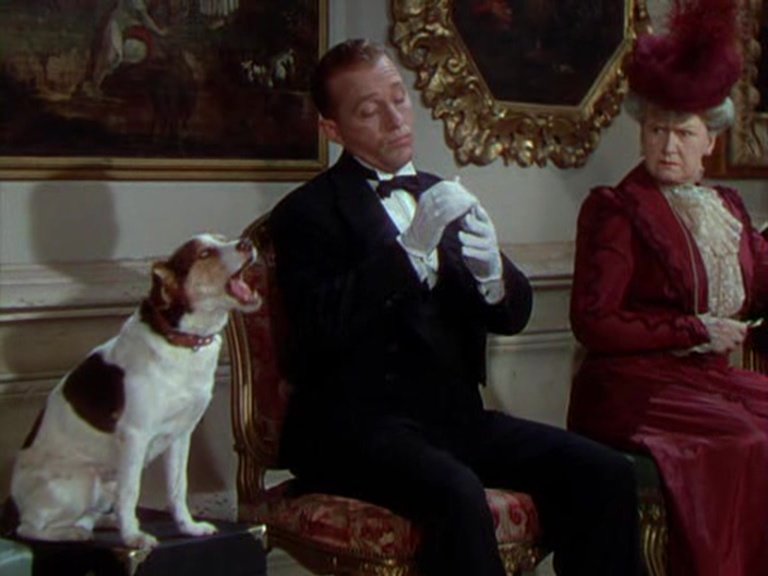
Video Quality
The Emperor Waltz makes its Blu-Ray debut courtesy of Kino Classics with a digital AVC encoded 1080p transfer that appears to be derived from a really solid older master that is in good shape. Instances of print damage such as nicks and lines occasionally pop up, but overall clarity and detail is excellent. The presentation is enjoyable throughout most of the runtime with image stability and delineation being handled well. This transfer maintains the natural film grain of the presentation with only minor instances of it seeming a bit thick. The picture can run a bit soft in long shots and in the optical dissolves, but colors are well saturated with the bright hues coming through. Skin tones are natural and consistent with subtle facial features easily noticeable in closeup. Black levels hold up well with very little in the way of crush. This presentation may have looked a bit better with a new master, but fans of the film will be pleased to see how well it looks.
Audio Quality
The Blu-Ray comes with a stellar DTS-HD 2.0 Master Audio track that serves this film really well. The first thing you will notice is the grandiosity of the Victor Young score and the clarity of the songs. Despite the strength of these elements, nothing ever overpowers the dialogue or other important information. Dialogue and background noises are represented in perfect harmony with all competing elements. This track shows no discernible age related wear and tear such as hissing or popping. All of the sound effects and music appear to be faithful to the intent of Wilder. There are also optional English (SDH) subtitles included for the feature film. You could not ask for better from Kino Classics.
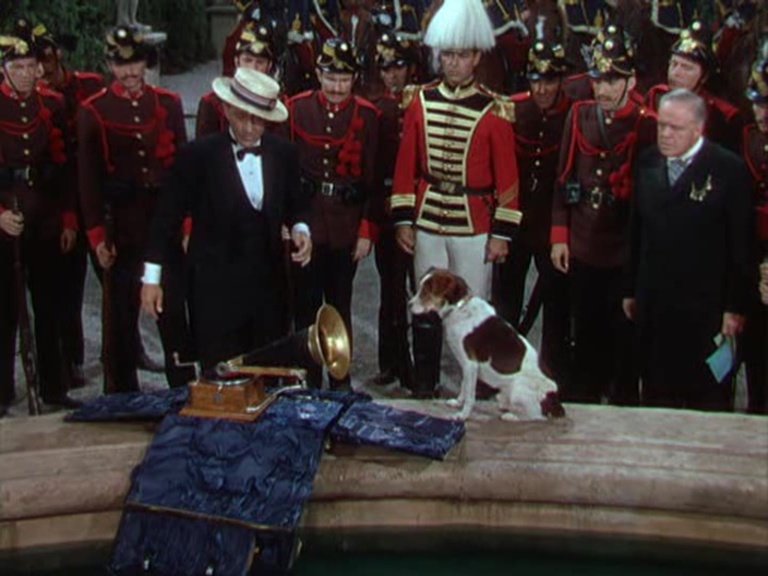
Special Features
- Audio Commentary: Film Historian Joseph McBride, Author of Billy Wilder: Dancing On The Edge, provides an in-depth commentary track which is very illuminating. In this track, McBride explores the relationship Wilder had with this film, the period of time in which it was made, the background of the performers, the themes of the narrative and much more. There is not much room for silence here as nearly every moment is filled with new insight.
- Billy Wilder and Volker Schlöndorff Discuss The Emperor Waltz: A three-minute vintage piece in which Wilder gives a few brief insights into the film and his personal life.
- Trailers: There are trailers provided for Road To Morocco, Kiss The Blood Off My Hands, The Lost Weekend, Five Graves To Cairo, A Foreign Affair, Witness For The Prosecution, Irma La Douce, One Two Three, The Fortune Cookie and Thoroughly Modern Millie.
Final Thoughts
The Emperor Waltz is not top-tier Billy Wilder, but there is enough of his signature style to keep you invested in the production. Bing Crosby and Joan Fontaine do not exude that special chemistry that makes the best pictures, but the remainder of the ensemble do a nice job of making a good impression. Fans of Crosby’s voice should enjoy the few tunes he is able to belt out along this journey. Kino Classics has released a Blu-Ray with an admirable A/V presentation and a couple of fun supplemental features. If you are looking to keep adding to your Billy Wilder collection, this release should not disappoint.
The Emperor Waltz will be available to purchase on Blu-Ray on August 17, 2021.
Note: Images presented in this review are not reflective of the image quality of the Blu-Ray.
Disclaimer: Kino Classics has supplied a copy of this disc free of charge for review purposes. All opinions in this review are the honest reactions of the author.

Dillon is most comfortable sitting around in a theatre all day watching both big budget and independent movies.


